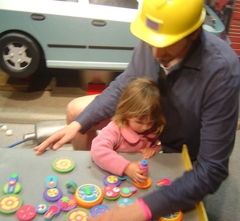 Family therapy can look many different ways, with a wide variety of interventions, but I think all family therapists would agree that the central focus of treatment is to help strengthen the bond between caregivers and their children. Supporting the parent-child relationship is one of the primary reasons we bring the whole family into sessions instead of focusing solely on the individual child (IP) in play therapy. Filial Therapy is a therapeutic process emphasizing and strengthening the relationship between parent and child as a means of alleviating struggles within the family. When I mention to colleagues that I provide Filial Therapy, I often get quizzical looks, so my objective is to give a brief, yet (hopefully) thorough snapshot of how Filial therapy can be an effective intervention for parents to build deeper relationships with their children. I touched in with Karen Pernet, LCSW and Registered Play Therapist, to ask a few questions, as she has many years experience training therapists in Filial therapy. Diana: “In a nutshell, how would you describe Filial Therapy?” · Karen: “It is a psycho-educational family intervention in which the therapist trains and supervises parents to hold special child-centered play sessions with their own children.” Say a little more about what makes Filial Therapy stand out from other family interventions. · It’s a therapy that combines play therapy with parenting support where the parents are totally involved, and facilitating the process of healing with their child. Play is the natural language of children around ages 3-12 years old, and non-directive play is healing. The therapist has the unique role of creating the space for parents to learn directly applicable skills to be fully involved in the therapeutic process. And since I know many Bay Area parents who are really invested in their child’s healing process, I can imagine that many parents would really get on board with Filial. · It does take effort from the parents. One of the things that I like is that the parent training aspect includes play and laughter, which creates a unique and positive relationship between therapist and parent. Filial therapists use a lot of positive learning techniques, whereby modeling these skills for parents in relationship with their children. Also, because each of the parents is involved (when possible), there aren’t issues of confidentiality. Meaning: both therapist and parents are seen as the experts and talk about the play together. The therapist supports the parents to understand themes of the play and helps with at home interventions. It’s a highly collaborative process. Building therapeutic alliance between therapist and parent is so important to engage the parents and instill a sense of hope. I know that parents learn skills in Filial like structuring, empathic listening (which helps them enter into and understand their child’s inner world) and limit setting. Seems like it might be hard for parents to translate these skills to real life tantrums and let’s say, challenges with transitioning. · Once parents practice the skills in the safety of “special play time,” it becomes easier. Parents are practicing in a kind of laboratory. The process is slowed down so they get the positive experience of being effective with the skills in the sessions. Together, we also look at the challenges parents might have in applying the skills like setting limits outside of the therapy room. So, parents learn the skills, get supportive feedback from the therapist, conduct special play sessions with their child in the office, and then prepare to transition these sessions at home. About how many sessions can they expect to come into the office? · Around 20-25, depending on the number of children in the family. More is needed if there is a trauma history or a lot of difficult behaviors. Because Filial isn’t problem-focused, but relationship-focused, I don’t single out the IP (Identified Patient). Each parent learns skills to work in dyads with each child. Please give the readers a brief overview of what the whole process looks like. · After the initial intake, family therapy session, and a session where parents observe a modified child-centered play session, the next three sessions are spent teaching skills to the primary caregivers. Then they conduct the special play sessions with their child in the office while I observe. Afterwards, I talk with the parents about their internal process, thoughts and feelings about the dynamic with their child, and provide feedback about the skills. We will have ongoing discussions around themes that arise, at-home interventions, and how to transfer “special play time” to home. Are there specific families for whom Filial Therapy is particularly useful? · Adoption, separation and divorce, single parenting, families that are reunifying and where there’s been loss. Filial is supportive for children who are showing signs of depression, anxiety, oppositional behavior, and ADHD (particularly to help parents understand their kid). Most parents are candidates for Filial, except those are actively abusive, addicted or are unable to focus on their child for at least 15 minutes. Karen, I know there’s so much more we could add, but is there anything that feels particularly relevant? · Filial Therapy is culturally appropriate because the parents are conducting the play sessions with their child. Filial can be integrated with other family therapy and more directive individual play therapy. Diana Halfmann, MFT provides Play, Filial, and Family Therapy in her private practice in San Francisco. She provides individual psychotherapy and Shamanic Counseling for adults who are at a crossroads and interested in learning how to conduct shamanic journeys with the sound of the drum. (415) 857-3901 Karen Pernet, LCSW and Registered Play Therapist. She trains therapists in Filial therapy and has a private practice in the East Bay. Comments are closed.
|
Author:
|
 RSS Feed
RSS Feed